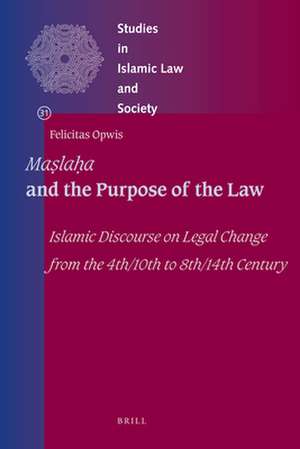<i>Maṣlaḥa</i> and the Purpose of the Law: Islamic Discourse on Legal Change from the 4th/10th to 8th/14th Century: Studies in Islamic Law and Society, cartea 31
Autor Felicitas Opwisen Limba Engleză Hardback – 30 mai 2010
Din seria Studies in Islamic Law and Society
- 18%
 Preț: 1054.08 lei
Preț: 1054.08 lei - 18%
 Preț: 1321.86 lei
Preț: 1321.86 lei - 18%
 Preț: 696.18 lei
Preț: 696.18 lei - 18%
 Preț: 747.18 lei
Preț: 747.18 lei - 18%
 Preț: 1088.87 lei
Preț: 1088.87 lei - 18%
 Preț: 843.76 lei
Preț: 843.76 lei - 18%
 Preț: 697.03 lei
Preț: 697.03 lei - 18%
 Preț: 696.87 lei
Preț: 696.87 lei - 18%
 Preț: 720.21 lei
Preț: 720.21 lei - 18%
 Preț: 620.48 lei
Preț: 620.48 lei - 18%
 Preț: 852.77 lei
Preț: 852.77 lei - 18%
 Preț: 862.90 lei
Preț: 862.90 lei - 18%
 Preț: 1078.23 lei
Preț: 1078.23 lei - 18%
 Preț: 683.84 lei
Preț: 683.84 lei - 18%
 Preț: 754.92 lei
Preț: 754.92 lei - 18%
 Preț: 649.27 lei
Preț: 649.27 lei - 18%
 Preț: 787.89 lei
Preț: 787.89 lei - 18%
 Preț: 681.58 lei
Preț: 681.58 lei - 18%
 Preț: 762.55 lei
Preț: 762.55 lei - 18%
 Preț: 797.46 lei
Preț: 797.46 lei - 18%
 Preț: 1078.39 lei
Preț: 1078.39 lei - 18%
 Preț: 904.41 lei
Preț: 904.41 lei - 18%
 Preț: 635.38 lei
Preț: 635.38 lei - 18%
 Preț: 1144.80 lei
Preț: 1144.80 lei - 18%
 Preț: 867.08 lei
Preț: 867.08 lei - 18%
 Preț: 686.92 lei
Preț: 686.92 lei - 18%
 Preț: 575.74 lei
Preț: 575.74 lei - 18%
 Preț: 742.08 lei
Preț: 742.08 lei - 18%
 Preț: 818.40 lei
Preț: 818.40 lei - 18%
 Preț: 547.09 lei
Preț: 547.09 lei - 18%
 Preț: 688.99 lei
Preț: 688.99 lei - 18%
 Preț: 819.18 lei
Preț: 819.18 lei - 18%
 Preț: 548.10 lei
Preț: 548.10 lei - 18%
 Preț: 542.26 lei
Preț: 542.26 lei - 18%
 Preț: 693.89 lei
Preț: 693.89 lei - 18%
 Preț: 822.70 lei
Preț: 822.70 lei - 18%
 Preț: 547.54 lei
Preț: 547.54 lei - 18%
 Preț: 547.95 lei
Preț: 547.95 lei - 18%
 Preț: 671.39 lei
Preț: 671.39 lei - 18%
 Preț: 578.16 lei
Preț: 578.16 lei - 18%
 Preț: 1367.97 lei
Preț: 1367.97 lei - 18%
 Preț: 999.33 lei
Preț: 999.33 lei - 15%
 Preț: 497.76 lei
Preț: 497.76 lei - 18%
 Preț: 762.34 lei
Preț: 762.34 lei - 18%
 Preț: 621.33 lei
Preț: 621.33 lei - 18%
 Preț: 1396.94 lei
Preț: 1396.94 lei - 18%
 Preț: 988.45 lei
Preț: 988.45 lei - 18%
 Preț: 551.02 lei
Preț: 551.02 lei
Preț: 941.61 lei
Preț vechi: 1148.30 lei
-18% Nou
Puncte Express: 1412
Preț estimativ în valută:
180.17€ • 188.62$ • 149.08£
180.17€ • 188.62$ • 149.08£
Carte indisponibilă temporar
Doresc să fiu notificat când acest titlu va fi disponibil:
Se trimite...
Preluare comenzi: 021 569.72.76
Specificații
ISBN-13: 9789004184169
ISBN-10: 9004184163
Pagini: 370
Dimensiuni: 165 x 244 x 25 mm
Greutate: 0.75 kg
Editura: Brill
Colecția Brill
Seria Studies in Islamic Law and Society
ISBN-10: 9004184163
Pagini: 370
Dimensiuni: 165 x 244 x 25 mm
Greutate: 0.75 kg
Editura: Brill
Colecția Brill
Seria Studies in Islamic Law and Society
Notă biografică
Felicitas Opwis, Ph.D. (2001) in Arabic and Islamic Studies, Yale University, is Assistant Professor of Arabic and Islamic Studies at Georgetown University. Her publications address the development of Islamic legal theory in light of intellectual currents and historical environment.
Recenzii
“… cinq chapitres d’une précision admirable…”
J. Dean in REVUE D’HISTOIRE ET DE PHILOSOPHIE RELIGIEUSES 92.2 (2012), 293.
“…this book is terrific scholarship on a topic of much wider importance than it may initially appear.”
Paul R. Powers in Journal of the American Oriental Society 132.3 (2012), 332-335.
J. Dean in REVUE D’HISTOIRE ET DE PHILOSOPHIE RELIGIEUSES 92.2 (2012), 293.
“…this book is terrific scholarship on a topic of much wider importance than it may initially appear.”
Paul R. Powers in Journal of the American Oriental Society 132.3 (2012), 332-335.
